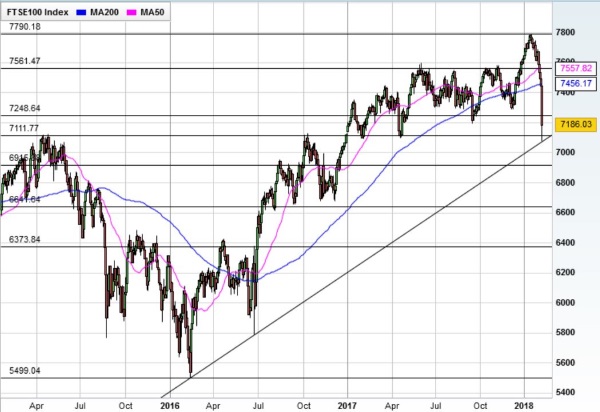A sensible correction, or does FTSE 100 have further to fall?
6th February 2018 13:50
by Graeme Evans from interactive investor
Share on
A justified reaction to recent exuberance or the start of something more significant? This remains the burning question for investors after a spectacular couple of sessions in which global markets finally bared their teeth and rediscovered the powers of volatility.
In the United States, where the sell-off started on Friday amid fears that rising inflation will lead to a more aggressive stance on interest rates, the paper loss amounted to just under $2 trillion over two days. The Wilshire 5000, which tracks all US markets, suffered its worst-ever two-day points drop.
The index has already surrendered all its gains from the past year, but there were some signs of stabilisation today as the top flight pulled back from the 3%-plus slump seen at Tuesday's opening. Significantly, the FTSE 100 remains comfortably above the 7,000 threshold.
While the rolling news channels will continue to give the story top billing, the view from a number of commentators appears more relaxed. After all, isn't this how markets are supposed to behave from time to time?
In fact, it would have been far more worrying if they had ignored the threat of inflation or the imminent change of leadership at the US Federal Reserve, and instead allowed the long tech-fuelled rally to continue unchecked.

James Bateman, chief investment officer, Multi Asset, Fidelity International, said the slump was the greatest sign of real health in markets for a long time.
He added: "In a world where the concept of a "correction" almost feels alien and where equities felt like an unstoppable one-way bet for a while, the normality of a setback can feel more painful.
"Holding this course as volatility eases won't seem easy — but at this stage of the cycle, the money is made by keeping your head when others are losing theirs."
Bateman said that even accounting for the recent price movements, US equities remain up by around 50% since early 2016. "The current price action may feel unusual because we have become so used to a low volatility environment, with economic data having been consistently positive across the globe in 2017."
There have been mixed messages on the outlook for markets in recent weeks, with fund manager Neil Woodford among those warning that there are echoes of the tech bubble in the performance. He believes that investors have forgotten about risk and that this is playing out in inflated asset prices and valuations.
Other investors think we are in the melt-up, or end phase of a bubble. Only last month, the latest Bank of America Merrill Lynch fund manager survey showed that a majority of investors are now expecting the peak in equity markets in 2019 or beyond.
But having benefited from the support of central banks for many years, investors are clearly spooked by the prospect of much higher interest rates in 2018.
The 10-year US Treasury yield just reached its highest level in four years before falling back. The sharp rise followed official figures on Friday showing that US wages increased at their fastest pace since 2009.
Despite the increased economic uncertainty, there are still grounds for optimism, with ability to double profits in today's 2017 annual results a reminder of continued strength in the blue-chip arena.
Richard Hunter, head of markets at interactive investor, said: "Corporate earnings continue to justify valuations, the general synchronised economic recovery is still intact, and even an aggressive increase in the interest rate across the pond would still likely leave them at relative historic lows."
Hunter notes that yields remain attractive with many still considering equities to be the investment destination of choice. "Providing that the current situation of letting some air out of the tyres does not result in a puncture, this reset could be seen as a justified reaction to recent exuberance."
These articles are provided for information purposes only. Occasionally, an opinion about whether to buy or sell a specific investment may be provided by third parties. The content is not intended to be a personal recommendation, and is not provided based on an assessment of your investing knowledge and experience, your financial situation or your investment objectives. The value of your investments, and the income derived from them, may go down as well as up. You may not get back all the money that you invest. The investments referred to in this article may not be suitable for all investors, and if in doubt, an investor should seek advice from a qualified investment adviser.